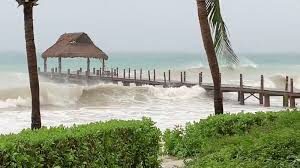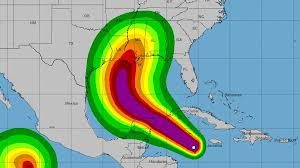
Oil and natural gas production in the Gulf of Mexico is being interrupted again as Hurricane Delta, the record 10th storm this season prepares to hit the southern states of Louisiana, Mississippi, Alabama and Florida.
Delta is poised to clip the Yucatan Peninsula and at last report had become a Category 2 hurricane with maximum sustained winds of 100 miles per hour.
On its current path, the storm will likely cause oil and natural gas production offshore Louisiana to shut down, and it poses a threat to onshore refineries and shipping, said Jim Rouiller, lead meteorologist with the Energy Weather Group. Output from the Gulf has been disrupted several times this year from tropical storms and hurricanes moving through the region.
“Expect widespread shut-ins of rigs and platforms across the upper Gulf Coast over next two days,” Rouiller said. “Significant impact and disruption to the U.S. energy production area of the upper Gulf is likely as the week wears on.”

The storm became hurricane strength Monday night local time, and it could reach tree-snapping Category 3 power on the five-step Saffir-Simpson scale as it hits Mexico, said Ryan Truchelut, president of Weather Tiger LLC reported Bloomberg.
“Everyone in Louisiana, Mississippi, Alabama and the western Florida panhandle should be prepared for a hurricane landfall,” Truchelut said. “It is pretty likely we are going to be seeing some significant impacts along the central Gulf coast.”
Delta would be the fourth hurricane to strike the Gulf in 2020, and the 10th storm to hit the U.S. It’s also this year’s 25th named system, only the second time that mark has been reached in records going back to 1851. And it’s the earliest point at which that many storms have been recorded. An all-time high of 28 storms formed in 2005, including deadly Hurricane Katrina, which inundated New Orleans.
The hurricane center calls for Delta’s winds to peak at 120 mph then weaken to 100 mph before it strikes the U.S. coast. A lot will depend on how much power it loses crossing the Yucatan and whether wind shear tears at its structure and cooler water robs it of fuel. Hurricanes depend on warm ocean water to build strength.
Source: Bloomberg





